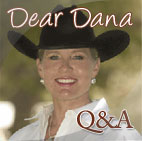A colorful ‘World’ in Oklahoma
Californians shine, bring home PtHA World titles and reserves
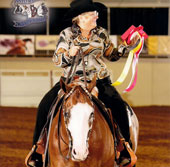
After her first time in the saddle at the PtHA World Show, Pat Langston of Banning and at brought home a pair of Reserve World titles with Cash Bar Interest.
TULSA — Pat Langston of Banning may not have started riding until she turned 60, but the former show mom is making up for lost time on the show circuit.
Along with her daughter Kelly, the pupil of Redlands trainer Kirsten Hertsgaard competed at the 46th Annual Pinto World Championship Horse Show with her new gelding, Cash Bar Interest, and came away with a handful of ribbons.
“There are nine of us girls from Kirsten’s barn, and we girls grabbed our horses and went down there for 2 1/2 weeks and played really hard,” said Pat, who took Elite Amateur Division (55-over) Reserve PtHA World titles in both Western Pleasure and Discipline Rail on her 10-year old APHA-PtHA gelding. “When I first got to ride him four months ago, I was so novice, I didn’t know anything. Kristen’s been working with me and Kelly rides him, too — I got to do some really good time on him and he just came together for me.”
Red, White & Blue GP goes ‘international’
Salvador Onate of Mexico and Charro lead charge of foreigners in San Juan
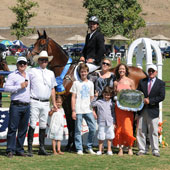
Salvador Onate and Charro celebrate the win with friends and family in the $30,000 Red, White & Blue Grand Prix July 3 in San Juan Capistrano.
SAN JUAN CAPISTRANO — Salvador Onate of Mexico is finding his first year on the American circuit most enjoyable.
Riding Charro, Onate exhibited speed and precision to top 33 other entries and win the $30,000 Red, White & Blue Grand Prix on July 3. Course designer Anderson Lima of Brazil had set a technical track with 16 efforts as well as a tight time allowed. Six pairs successfully rode without fault in the first round, four going double clear. Going 29th, Onate had the advantage of seeing the track.
“When I was walking the course, I thought it would be a difficult run to make a clear round,” Onate said. “I had to focus on the strides, because there were many options. I had the opportunity of watching a couple of riders do it, and then I took my options.”
Juniors control 2011 Woodside Circuit opener
Roberson, Albrecq shine in $10K Woodside Jumper Classic
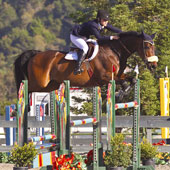
Jenni Martin-McAllister and Glados welcome the week with a win in the $2,500 Open Welcome Stake.
WOODSIDE — The Woodside Circuit Opener June 22-26 kicked off the Woodside Summer Circuit with beautiful weather, fierce competition, and fun people. Some of those who had the most fun were the junior riders, who showed they are a force to contend with.
The juniors swept the competition in the $10,000 Woodside Jumper Classic on Saturday night. An exciting class led to a very dramatic finish with two juniors taking the top prizes after putting in the only two double-clear rounds of the competition. Brittany Albrecq (Jenni Martin-McAllister, trainer) was the first to go clear and first to come back for the seven-horse jump-off aboard her Union Jack. Haley Roberson (Rachel Yorke, trainer) was right behind her with Chantre (Equinity, LLC, owner), and she knew she had to be quick to win.
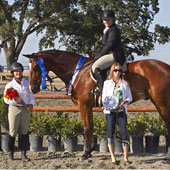
Julie Keville-Young and Georgetown win the $2,500 USHJA National 3’ Hunter Classic
With five jump-off rides remaining, Roberson watched every trip nervously.
“I was most worried about Maja Lindeman and Live Fire (Vicki Juelsgaard, owner),” commented Roberson, although Maja, trainer at Willow Tree, had an unfortunate rail in the jump-off. While a few riders crossed the wire in time, none could catch Roberson without dropping a rail, and she rode away with the top prize and left Albrecq in second.
Let’s start: Five Easy Pieces
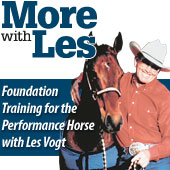 First In A Series
First In A Series
In the next few installments, Les Vogt takes you through exercises of his Five Easy Pieces. When you’ve mastered them, you should be able to put any part of your horse’s body where you want it, without resistance.
Doesn’t it take your breath away to watch a sensational reining or cow horse perform? It does to me, just like it did back when I was a kid and I saw my first stock horse in action. But the best thing about it is that these horses just keep getting better and better. First, because we’re breeding them better, and second, because we’re riding them better. And the biggest key I have found in developing that brilliant performance is the time that I spend getting complete body control during the foundation stage of my training on a young horse.
Pre-futurity warm-up: Fairlea Ranch opens up for practice
 Need some practice for the upcoming futurity season? Fairlea Ranch in Exeter will be offering futurity practice sessions the weekend of Aug. 6-7. Saturday will feature cutting, and Sunday will be used for reining and cow work. Because of a limited number of stalls and slots, the Fairlea Ranch folks urge you to call and make your reservation now! (559) 594-5400, See the ad on page 80.
Need some practice for the upcoming futurity season? Fairlea Ranch in Exeter will be offering futurity practice sessions the weekend of Aug. 6-7. Saturday will feature cutting, and Sunday will be used for reining and cow work. Because of a limited number of stalls and slots, the Fairlea Ranch folks urge you to call and make your reservation now! (559) 594-5400, See the ad on page 80.
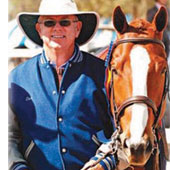 Huntington Central Park Equestrian Center welcomes renowned trainer and clinician Don Stewart for an educational clinic on Tuesday-Wednesday, Aug. 9-10. Stewart is a two-time Chronicle Hunter Horseman of the Year, chairman of the USHJA Junior Hunter Task Force, and top trainer to many champion riders and horses as well as a highly regarded judge. Clinic riders will receive four hours of instruction in groups of six to eight horses, and stabling is available. Organizers are suggesting that applications be submitted early because of high demand. For more info, call (714) 848-6565, and se the ad on page 81.
Huntington Central Park Equestrian Center welcomes renowned trainer and clinician Don Stewart for an educational clinic on Tuesday-Wednesday, Aug. 9-10. Stewart is a two-time Chronicle Hunter Horseman of the Year, chairman of the USHJA Junior Hunter Task Force, and top trainer to many champion riders and horses as well as a highly regarded judge. Clinic riders will receive four hours of instruction in groups of six to eight horses, and stabling is available. Organizers are suggesting that applications be submitted early because of high demand. For more info, call (714) 848-6565, and se the ad on page 81.
Join Hidden Hills Equestrian Ranch on Saturday, July 23, from 11 a.m. to 3 p.m. for its Grand Opening Celebration! This full service boarding and training facility in Bonsall now offers a variety of boarding options, including a beautiful, new showcase barn. There is a large pleasure arena with lights, two 60-foot round pens, tack sheds, turn-outs, wash racks, groomed and chipped trail endurance conditioning course…and much more! Hidden Hills even has mare breeding and foaling facilities, stallion standing and a breeding center. Come enjoy lunch, refreshments and special presentations — and help welcome Laura Cronk Equine Management to Hidden Hills. To RSVP and to learn more, call (760) 468-3691. See the ad on page 34.
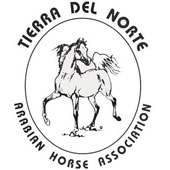 Tierra Del Norte Arabian Horse Association will host its Second Annual Lou Roper Clinic on Sunday, July 31, from 9 a.m.to 3 p.m. at the Roper Ranch in San Marcos. Come and enjoy the magic of Lou in beautiful Twin Oaks! This is an “audit-only class”, and your $30 fee includes breakfast and lunch. Lou will cover beginning to bridle-less training. Find out his training techniques toward becoming the ultimate horseman. If you’re interested in having a particular topic covered, please submit questions via email to theworksi@aol.com before July 29. To register, call Cheryl Goodheim at (760) 434-5663. See the ad on page 80.
Tierra Del Norte Arabian Horse Association will host its Second Annual Lou Roper Clinic on Sunday, July 31, from 9 a.m.to 3 p.m. at the Roper Ranch in San Marcos. Come and enjoy the magic of Lou in beautiful Twin Oaks! This is an “audit-only class”, and your $30 fee includes breakfast and lunch. Lou will cover beginning to bridle-less training. Find out his training techniques toward becoming the ultimate horseman. If you’re interested in having a particular topic covered, please submit questions via email to theworksi@aol.com before July 29. To register, call Cheryl Goodheim at (760) 434-5663. See the ad on page 80.
 The Foundation for the Pure Spanish Horse will present its 2011 National Celebration on Aug. 30-Sept. 3 at the South Point Equestrian Center in Las Vegas, Nev. In addition to the morphology, working equitation, performance, heritage and specialty classes, there will also be Dressage at Celebration – with a $5,000 Musical Freestyle Challenge! And don’t miss the must-see ‘Horse of the Kings Theater’ show on Saturday, Sept. 3, at 7:30 p.m., presenting Mystic PRE. With vendors, an art show, exhibitions, clinics and more, this is the premier event for the Pure Spanish Horse in the U.S. For more info, call (505) 294-0800. See the ad on page 10.
The Foundation for the Pure Spanish Horse will present its 2011 National Celebration on Aug. 30-Sept. 3 at the South Point Equestrian Center in Las Vegas, Nev. In addition to the morphology, working equitation, performance, heritage and specialty classes, there will also be Dressage at Celebration – with a $5,000 Musical Freestyle Challenge! And don’t miss the must-see ‘Horse of the Kings Theater’ show on Saturday, Sept. 3, at 7:30 p.m., presenting Mystic PRE. With vendors, an art show, exhibitions, clinics and more, this is the premier event for the Pure Spanish Horse in the U.S. For more info, call (505) 294-0800. See the ad on page 10.
Los Vaqueros de las Montanas Riding Club will celebrate “Old Miner’s Days” in Big Bear with their “Burro-Palooza!” The July 25-27 event at the Los Vaqueros Rodeo Grounds will feature a Burro Derby, Junior Rodeo and a Donkey Softball Tournament. Come cheer on local teams and enjoy the fun! See the ad on page 78.
The In Gate column is composed by the sales staff at the California Horsetrader. If you would like to put the California Horsetrader or our popular national internet site, horsetrader.com, to work for you, please call our display sales staff at 760/546-1184, or email to: sales@horsetrader.com
UC Davis: The shows CAN go on – carefully
Virus-scare clampdown is eased after study of California cases;
show managers receive guidelines to minimize risk to horses
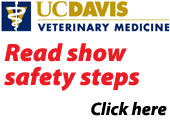 SACRAMENTO – After determining the virus that caused the death of one horse in California and the quarantine of 17 others is closely related to a single Utah horse show, the University of California Davis has informed horse show and event managers that the shows can go on – albeit carefully.
SACRAMENTO – After determining the virus that caused the death of one horse in California and the quarantine of 17 others is closely related to a single Utah horse show, the University of California Davis has informed horse show and event managers that the shows can go on – albeit carefully.
The UC Davis Veterinary Medical Teaching Hospital informed horse show and event managers Tuesday it has concluded the EHV-1 outbreak is centered around horses that were present at the National Cutting Horse Association’s Western National Championships held at the Golden Spike Event Center in Ogden Utah, from April 30 to May 8 or the Kern County Cutting Event in Bakersfield on May 13. This includes
State confirms SoCal EHV-1 cases
Sixteen of 17 inflicted horses linked to Utah cutting;
suspect case from Santa Ynez trail ride proves negative
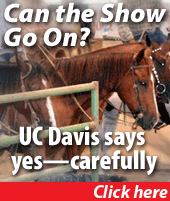 SACRAMENTO — The California Department of Food and Agriculture confirmed Sunday the list of California Equine Myeloencephalopathy (EHM) cases caused by the EHV-1 virus has grown to 17, including the first reported cases in Southern California.
SACRAMENTO — The California Department of Food and Agriculture confirmed Sunday the list of California Equine Myeloencephalopathy (EHM) cases caused by the EHV-1 virus has grown to 17, including the first reported cases in Southern California.
All but one of the 17 confirmed cases participated in the National Cutting Horse Association’s Western National Championships April 29-May 8 in Ogden, Utah, according to the CDFA. The only EHM case not involving a horse that participated at the Utah cutting show was a horse that had participated in the subsequent May 13 cutting in Bakersfield at the Kern County Fairgrounds, the report said.
A mare that did not particpate in either of the cuttings yet exhibited signs of EHM was subject of an investigation by Anmal Health Branch veterinarians who determined she did not have the same strain of virus as the horses in the confirmed cases. The mare, a participant in the Rancheros Vistadores ride in Santa Ynez May 5 – 12, reportedly exhibited neurological signs compatible with a number of equine diseases or conditions, but three sets of nasal swabs and blood testing on this mare indicated she was negative for the mutant strain of EHV-1 that causes EHM. Instead, she tested positive for a more common strain of EHV-1 that most frequently causes respiratory signs and on rare occasion causes neurological signs.
California reports counties with EHV-1 cases
All NCHA events May 20-22 cancelled as precaution;
Western States Horse Expo, PtHA World still on schedule
Horse with equine herpes symptoms euthanized
Two others at Bakersfield cutting confirmed positive; vets call for quarantine
 SACRAMENTO — Veterinarians are recommending a three- to four-week quarantine after one horse was euthanized and two other ill horses at a Bakersfield cutting event have tested positive with Equine Herpes Myeloencephalopathy (EHV-1).
SACRAMENTO — Veterinarians are recommending a three- to four-week quarantine after one horse was euthanized and two other ill horses at a Bakersfield cutting event have tested positive with Equine Herpes Myeloencephalopathy (EHV-1).
The University of California Davis reported at least two California confirmed cases of EHV-1 infection in horses that had recently competed at the National Cutting Horse Association Western National Championship Show in Ogden, Utah, and then traveled to the Kern County Fairgrounds. One horse was transported from Bakersfield to the isolation facility at the William R. Pritchard Veterinary Medical Teaching Hospital. Another horse that attended the Ogden show was also sent to UC Davis. Both of these horses have been confirmed as positive for EHV-1. In addition, at least four additional horses in various areas of Northern California have been confirmed as positive for EHV-1.
During the past week in Colorado, there have been at least two confirmed cases of equine herpes-1 infection in horses that competed at the NCHA show in Odgen.
The William R. Pritchard Veterinary Medical Teaching Hospital (VMTH) at UC Davis operates an isolation facility that was designed specifically to allow us to provide the best possible care to horses with infectious diseases such as EHV-1, while completely segregating them from other hospitalized horses and outpatients. The isolation facility is located a substantial distance from the main hospital, utilizes a dedicated group of staff and employs rigid infectious disease control and containment protocols that prevent other horses from becoming exposed. Currently, the two horses mentioned above are being treated under maximum isolation. These horses have no contact with other horses at the hospital. Because of the presence of EHV-1 in the community, the VMTH is taking every precaution to prevent EHV-1 entry into the general hospital. Every horse admitted to the hospital is being tested for EHV-1 and full biosecurity precautions are in force during the next few weeks as necessary.
Equine herpesvirus is a common virus of horses worldwide, and can cause respiratory disease, abortions, and less commonly neurologic signs as it has in these cases. It is transmitted by aerosol and close contact between horses, including fomites such as shared tack, equipment and by human hands. Though there are vaccines available for prevention of respiratory disease and abortions caused by equine herpesvirus, there are currently none that are labeled for prevention of the neurologic form of the disease.
Officials at the VMTH urge horse owners to contact their veterinarian if their horse may have been exposed to EHV-1 at one of these shows or through contact with a horse that has returned from one of these events. In general, exposed horses should be isolated and have their temperatures monitored twice daily. If an exposed horse develops a fever, diagnostic testing of nasal swabs and blood should be performed. Consideration should be given to vaccination of resident, non-exposed horses on premises where potentially exposed horses are returning to, as per the veterinarian’s guidelines.
For a comprehensive fact sheet on EHV-1, click here.
Equine herpes scare is real; state urges caution
Outbreak of deadly virus at NCHA show April 30-May 8
in Ogden, Utah, prompts alert for California, Arizona owners
SACRAMENTO — A recent disease outbreak of Equine Herpes Myeloencephalopathy (EHV-1) has been traced to horses who attended the National Cutting Horse Associations’ Western National Championships in Odgen, Utah on April 30 – May 8. California horses who participated in this event may have been exposed to this EHV-1 virus, according to the California Department of Food and Agriculture.
The California Department of Food and Agriculture encourages owners of horses who participated in the Odgen, Utah, event to monitor their horses for clinical signs of disease. A rectal temperature in excess of 102F commonly precedes other clinical signs. Therefore, owners are urged to take temperatures on each individual horse(s) twice a day. If a temperature above 102F is detected, owners should contact their private practitioner immediately. Laboratory submission of nasal swabs and blood samples collected from the exposed horse can be utilized for virus detection and isolation.
The EHV-1 organism spreads quickly from horse to horse and the neurologic form of the virus can reach high morbidity and mortality rates. The incubation period of EHV-1 is typically 2-10 days. In horses infected with the neurologic strain of EHV-1, clinical signs may include: nasal discharge, incoordination, hind end weakness, recumbency, lethargy, urine dribbling and diminished tail tone. Prognosis depends on severity of signs and the period of recumbency. There is no specific treatment for EHV-1. Treatment may include intravenous fluids, anti-inflammatory drugs and other appropriate supportive treatment. Currently, there is no equine vaccine that has a label claim for protection against the neurological strain of the virus.
Horse-to-horse contact, aerosol transmission, and contaminated hands, equipment, tack, and feed all play a role in disease spread. However, horses with severe clinical signs of neurological EHV-1 illness are thought to have large viral loads in their blood and nasal secretions and therefore, present the greatest danger for spreading the disease. Immediate separation and isolation of identified suspect cases and implementation of appropriate biosecurity measures are key elements for disease control.
More info: http://1.usa.gov/105B_herpes



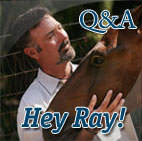
 Read Columns
Read Columns
